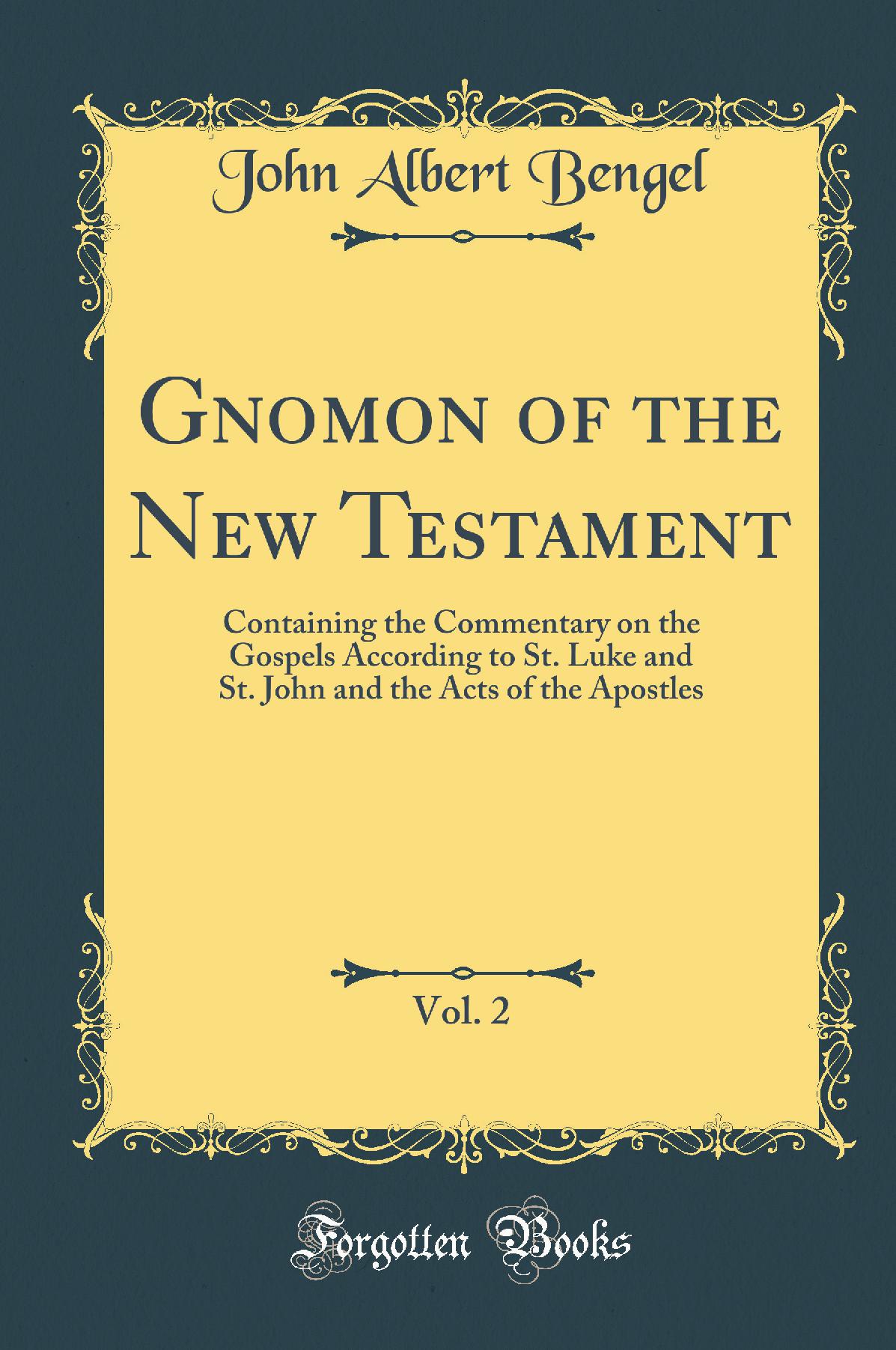Description
Excerpt from Gnomon of the New Testament, Vol. 2: Containing the Commentary on the Gospels According to St. Luke and St. John and the Acts of the Apostles
1 The names Lucius and Lucas are the same; except that the former, being a diminutive of the latter, has somewhat of a more familiar sound. Mention is made as early as in Acts xiii. 1 of a Lucius of Cyrene among the prophets and teachers of the Church, which at that time ?ourished at Antioch and there fore it must have been but a short time after the death which befel Herod (ch. Xii. A. Dion. Era, 44. It is owing to this, I am inclined to think, that Ense bius and others have considered Antioch as the native place of Luke. Further more, Paul makes mention of a certain Lucius among his ''kinsmen,'' Rom. Xvi. 21, and calls Lu/ce [lucas] his fellow-workman and the beloved Physician, Philem. Ver. 24; Col. Iv. 14. Now, whether he be only Luke [lucas], or also I/ucius, he is the very person who wrote the Acts of the Apostles, having aecom panied Paul himself from the Troad, first to Philippi (acts xvi. Next from Philippi to Troas, nay, even as far as to Rome (ch. Xx. 6, xxviii. 16 2 Tim. Iv. 11) and it is owing to this that he most frequently uses the first person plural in his narrative. Moreover the lively [vigorous] style of Luke, which is partien larly appropriate to the very joyful subject of the Acts, comprising, as they do, in their history the completion [carrying into effect] of the New Testament, seems to have derived some of its characteristics from the association of many years, which Luke maintained [enjoyed] with Paul. - Harm., pp. 35, 36. Lucas seems to me to be the contraction of Lucanus, as Silas from Silvanus, and to be altogether a distinct name from Lucius. Ed. And transl.
About the Publisher
Forgotten Books publishes hundreds of thousands of rare and classic books. Find more at www.forgottenbooks.com
This book is a reproduction of an important historical work. Forgotten Books uses state-of-the-art technology to digitally reconstruct the work, preserving the original format whilst repairing imperfections present in the aged copy. In rare cases, an imperfection in the original, such as a blemish or missing page, may be replicated in our edition. We do, however, repair the vast majority of imperfections successfully; any imperfections that remain are intentionally left to preserve the state of such historical works.
1 The names Lucius and Lucas are the same; except that the former, being a diminutive of the latter, has somewhat of a more familiar sound. Mention is made as early as in Acts xiii. 1 of a Lucius of Cyrene among the prophets and teachers of the Church, which at that time ?ourished at Antioch and there fore it must have been but a short time after the death which befel Herod (ch. Xii. A. Dion. Era, 44. It is owing to this, I am inclined to think, that Ense bius and others have considered Antioch as the native place of Luke. Further more, Paul makes mention of a certain Lucius among his ''kinsmen,'' Rom. Xvi. 21, and calls Lu/ce [lucas] his fellow-workman and the beloved Physician, Philem. Ver. 24; Col. Iv. 14. Now, whether he be only Luke [lucas], or also I/ucius, he is the very person who wrote the Acts of the Apostles, having aecom panied Paul himself from the Troad, first to Philippi (acts xvi. Next from Philippi to Troas, nay, even as far as to Rome (ch. Xx. 6, xxviii. 16 2 Tim. Iv. 11) and it is owing to this that he most frequently uses the first person plural in his narrative. Moreover the lively [vigorous] style of Luke, which is partien larly appropriate to the very joyful subject of the Acts, comprising, as they do, in their history the completion [carrying into effect] of the New Testament, seems to have derived some of its characteristics from the association of many years, which Luke maintained [enjoyed] with Paul. - Harm., pp. 35, 36. Lucas seems to me to be the contraction of Lucanus, as Silas from Silvanus, and to be altogether a distinct name from Lucius. Ed. And transl.
About the Publisher
Forgotten Books publishes hundreds of thousands of rare and classic books. Find more at www.forgottenbooks.com
This book is a reproduction of an important historical work. Forgotten Books uses state-of-the-art technology to digitally reconstruct the work, preserving the original format whilst repairing imperfections present in the aged copy. In rare cases, an imperfection in the original, such as a blemish or missing page, may be replicated in our edition. We do, however, repair the vast majority of imperfections successfully; any imperfections that remain are intentionally left to preserve the state of such historical works.
Details
Publisher - Forgotten Books
Language - English
Hardback
Contributors
Author
John Albert Bengel
Published Date -
ISBN - 9780265435496
Dimensions - 22.9 x 15.2 x 6.4 cm
Page Count - 1193
Payment & Security
Your payment information is processed securely. We do not store credit card details nor have access to your credit card information.

